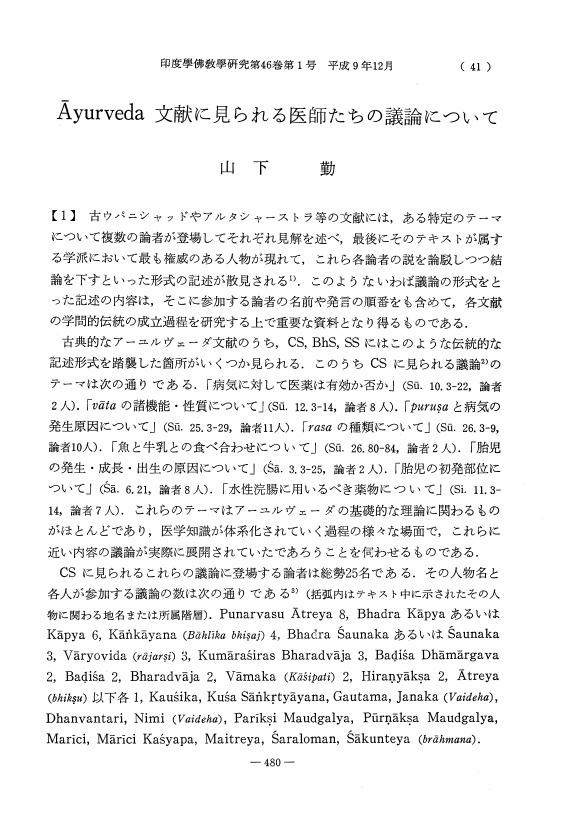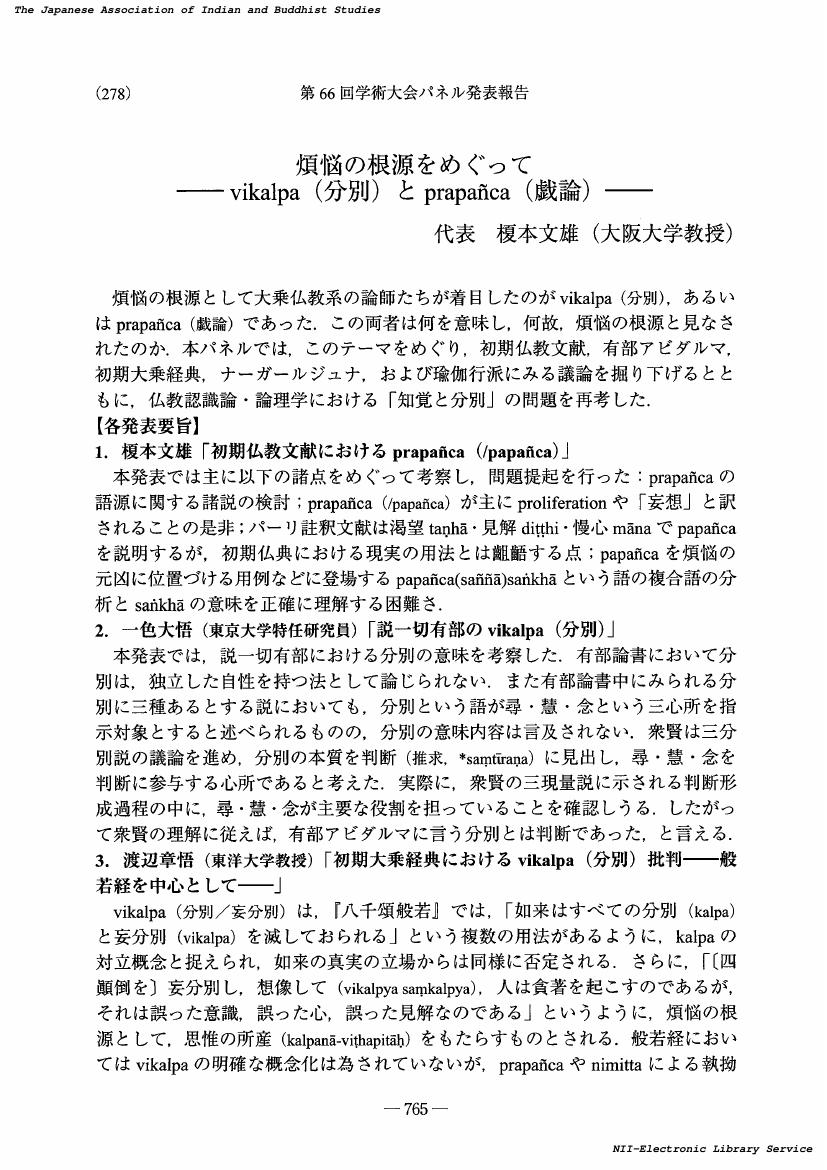1 0 0 0 『立正安国論』の自界叛逆難について
- 著者
- 佐藤 祐規
- 出版者
- 日本印度学仏教学会
- 雑誌
- 印度學佛教學研究 (ISSN:00194344)
- 巻号頁・発行日
- vol.48, no.2, pp.829-831, 2000
1 0 0 0 アンベードカールの佛教觀
- 著者
- 藤吉 慈海
- 出版者
- 日本印度学仏教学会
- 雑誌
- 印度學佛教學研究 (ISSN:00194344)
- 巻号頁・発行日
- vol.12, no.2, pp.612-615, 1964
1 0 0 0 OA 『マヌ法典』註釈における知行併合論
- 著者
- 吉水 清孝
- 出版者
- Japanese Association of Indian and Buddhist Studies
- 雑誌
- 印度學佛教學研究 (ISSN:00194344)
- 巻号頁・発行日
- vol.61, no.3, pp.1085-1092, 2013-03-25 (Released:2017-09-01)
知行併合(jnanakarmasamuccaya)論とは,輪廻を脱して解脱するためには,梵我一如の知のみならず,ヴェーダが定める祭式をはじめとする行が必要であるとするヴェーダーンタの立場であるが,『マヌ法典』の註釈家のうち,8世紀頃のBharuciと,9世紀のMedhatithiも,林住期と遊行期の生活規範を定めた第6章の註釈の中で,知行併合を唱えている.Medhatithiは,祭式が特定の果報をもたらすのとは別に,解脱の達成にも資することを立証しようとして,Satapathabrahmana 10.2.6.13を引用し,また「結合の別異性」(samyogaprthaktva)という解釈定理がこれには適用可能であり,祭主が自他の区別にこだわっているか自他を平等に見ることができるかに応じて,同じ祭式が有限な果報をもたらしもするし,ブラフマンとの合一に導くとも言えるとした.しかしMedhatithiによれば,祭式が解脱の達成に資する真の理由は,それがヴェーダ学習と子供の養育とともに,Taittiriyasamhita 6.3.10.5に説かれた「生得的負債」(rna)の返済手段となるからである.ヴェーダ学習により共同体の過去を継承し,祭式により共同体の現在の絆を強め,子供の養育により共同体の未来を確保することが人の果たすべき義務である.Medhatithiは,主人の横暴さに嫌気がさして奉公を辞めたがっている召使の姿を思い描いて人生を瞑想するよう勧める.ただし召使はけなげにも先に主人から得ていた幾ばくかのお金の分を働いて返そうと決意すると言い,家長としての義務遂行の必要性を強調している.さらにMedhatithiは,「瞑想に熟達した遊行者は,自分の善業を好ましい者たちに,悪業を好ましくない者たちに転移する」と述べる第79詩節を,「好ましい経験を得たことを自分の善業のせいに,好ましからざる経験を被ったことを自分の悪業のせいに帰すべきこと」を述べると読み替えて,修行の一環としての忍耐の重要さを説くものとした.しかしこのような解釈は,A. Wezlerが論じているように,後代の『マヌ法典』註釈家Kullukaによって,規範を恣意的に解釈していると批判された.Medhatithiによるこの解釈は彼の独創ではなく,Bharuciを継承している.また知行併合論者を自任するヴェーダーンタ学派のBhaskaraは第79詩節本来の趣旨を擁護して,RgvedaとMahabharataから,行為の結果を他人が被ることを認める詩節を引用する.知行併合論は世俗社会での義務を重視する思想家に広く受け入れられていたが,因果応報を厳密に自業自得で捉えるかどうかは見解が分かれていた.
1 0 0 0 宗門為本の戒律思想
- 著者
- 上田 霊城
- 出版者
- 日本印度学仏教学会
- 雑誌
- 印度學佛教學研究 (ISSN:00194344)
- 巻号頁・発行日
- vol.25, no.1, pp.132-133, 1976
1 0 0 0 倶舎論破我品の別撰論問題について
- 著者
- 三友 健容
- 出版者
- JAPANESE ASSOCIATION OF INDIAN AND BUDDHIST STUDIES
- 雑誌
- 印度學佛教學研究 (ISSN:00194344)
- 巻号頁・発行日
- vol.20, no.1, pp.156-157, 1971
1 0 0 0 Anusaya の語義とその解釈
- 著者
- 三友 健容
- 出版者
- JAPANESE ASSOCIATION OF INDIAN AND BUDDHIST STUDIES
- 雑誌
- 印度學佛教學研究 (ISSN:00194344)
- 巻号頁・発行日
- vol.23, no.2, pp.1007-1002, 1975
- 著者
- 三友 健容
- 出版者
- JAPANESE ASSOCIATION OF INDIAN AND BUDDHIST STUDIES
- 雑誌
- 印度學佛教學研究 (ISSN:00194344)
- 巻号頁・発行日
- vol.22, no.1, pp.501-497, 1973
- 著者
- 三友 健容
- 出版者
- JAPANESE ASSOCIATION OF INDIAN AND BUDDHIST STUDIES
- 雑誌
- 印度學佛教學研究 (ISSN:00194344)
- 巻号頁・発行日
- vol.26, no.2, pp.875-879, 1978
1 0 0 0 OA 『法華経』成立の諸問題(第61回学術大会パネル発表報告)
- 著者
- 三友 健容
- 出版者
- 日本印度学仏教学会
- 雑誌
- 印度學佛教學研究 (ISSN:00194344)
- 巻号頁・発行日
- vol.59, no.2, pp.800-799, 2011-03-20
1 0 0 0 OA 『婆沙論』と『大智度論』
- 著者
- 三友 健容
- 出版者
- 日本印度学仏教学会
- 雑誌
- 印度學佛教學研究 (ISSN:00194344)
- 巻号頁・発行日
- vol.58, no.1, pp.379-373, 2009-12-20
- 著者
- 三友 健容
- 出版者
- 日本印度学仏教学会
- 雑誌
- 印度學佛教學研究 (ISSN:00194344)
- 巻号頁・発行日
- vol.53, no.2, pp.625-631, 2005-03-20
1 0 0 0 日本・韓国佛教学交流の父金東華博士の一考察
- 著者
- 三友 健容
- 出版者
- JAPANESE ASSOCIATION OF INDIAN AND BUDDHIST STUDIES
- 雑誌
- 印度學佛教學研究 (ISSN:00194344)
- 巻号頁・発行日
- vol.51, no.1, pp.287-283, 2002
1 0 0 0 旧随界説について
- 著者
- 三友 健容
- 出版者
- JAPANESE ASSOCIATION OF INDIAN AND BUDDHIST STUDIES
- 雑誌
- 印度學佛教學研究 (ISSN:00194344)
- 巻号頁・発行日
- vol.29, no.1, pp.25-30, 1980
1 0 0 0 『アビダルマディーパ』作者に対する二・三の問題
- 著者
- 三友 健容
- 出版者
- JAPANESE ASSOCIATION OF INDIAN AND BUDDHIST STUDIES
- 雑誌
- 印度學佛教學研究 (ISSN:00194344)
- 巻号頁・発行日
- vol.27, no.1, pp.221-225, 1978
- 著者
- 三友 健容
- 出版者
- JAPANESE ASSOCIATION OF INDIAN AND BUDDHIST STUDIES
- 雑誌
- 印度學佛教學研究 (ISSN:00194344)
- 巻号頁・発行日
- vol.25, no.2, pp.718-722, 1977
1 0 0 0 倶舎論における svabhava について
- 著者
- 三友 健容
- 出版者
- JAPANESE ASSOCIATION OF INDIAN AND BUDDHIST STUDIES
- 雑誌
- 印度學佛教學研究 (ISSN:00194344)
- 巻号頁・発行日
- vol.21, no.1, pp.359-362, 1972
1 0 0 0 『アビダルマディーパ』における『本論』
- 著者
- 三友 健容
- 出版者
- 日本印度学仏教学会
- 雑誌
- 印度學佛教學研究 (ISSN:00194344)
- 巻号頁・発行日
- vol.55, no.2, pp.875-867,1271, 2007
There are many untitled "<i>Sdstras</i>" which are quoted in the <i>Abhidharmadipa</i>, which I will abbreviate here as ≪<i>ADV</i>≫. Needless to say, we can understand what the author of the <i>ADV</i> stands upon by checking these quoted texts.<br>There are over 40 examples where Vasubandhu, the author of <i>Abhidharmakosabhasya</i> (<i>AKBh</i>), used "<i>Sastra</i>" in his text. Of these examples, the title of the <i>Prakarana-sastra</i> and the <i>Jñana prasthana</i> are known as the most common. On the other hand, "<i>Sastra</i>" is used in 20 sentences in the <i>ADV</i>. Of these, three refer to texts that are non-Buddhist, and the other 17 examples seem to be quoted from some of the so-called <i>Six pada-sastras</i>.<br>I have tried to check the standpoint of the dipakara, the author of the <i>ADV</i>, by researching these quoted "<i>Sastras</i>". Basically, the dipakara specifically mentions the title of "<i>Sastra</i>" only in reference to the <i>Prajñapti-bhasya</i>, <i>Prakarana-sastra</i> and the <i>Jñana-prasthana</i>. I could not find the titles of <i>Dhatukaya</i> and <i>Vijñana-kaya</i> mentioned anywhere, but I was able to identify sentences quoted from the <i>Abhidharmâvatara</i>, the <i>Prakarana-sastra</i>, the <i>Samgiti-paryaya</i>, the <i>Dharma-skandha</i>, the <i>Jñana-prasthana</i>, the <i>Mahavibhasa</i>, the <i>AKBh</i>, the <i>Nyayanusara</i> and the <i>Samayapradipika</i> by researching the use of the word of <i>sastra</i>. The dipakara even adopted the opinion of the <i>AKBh</i> when the latter represented the correct doctrine of the Sarvastivadin school.<br><i>AKBh</i> refers to "<i>Mahavibhasa</i>" as simply "<i>Vibhasa</i>", and the masters mentioned there by the term "<i>vaibhasika</i>". The <i>ADV</i>, however, refers to the same text as "<i>Vaibhasa</i>". It is not clear why <i>ADV</i> uses this form.<br>There are two possibilities why <i>ADV</i> uses the form "<i>Vaibhasa</i>":<br>1) "<i>Vaibhasa</i>" comes from the rule of the Sanskrit grammar which states that when a noun changes its vowel to vrddhi form, it means "that which belongs to or is affiliated with the original noun." In this case it means texts which belong to "<i>Vibhasa</i>."<br>2) <i>ADV</i> intentionally changed the word used by the dipakara's rival, Vasubandhu, because the dipakara hated him. In fact, the dipakara created many original expressions from words previously used in the <i>AKBh</i>.<br>I would like to suggest that the most likely possibility is the first. This would mean simply texts belonging to the Sarvastivadin School, because it is difficult to believe that the dipakara changed the title of the original text.<br>The major difference between the <i>ADV</i> and the <i>AKBh</i> is that the dipakara uses texts of the Madhyamika and Yogacaya schools to criticise Mahayana Buddhism.
1 0 0 0 『般若灯論』における説一切有部説 (二)
- 著者
- 三友 健容
- 出版者
- 日本印度学仏教学会
- 雑誌
- 印度學佛教學研究 (ISSN:00194344)
- 巻号頁・発行日
- vol.34, no.2, pp.778-784, 1986
1 0 0 0 OA Ayurveda 文献に見られる医師たちの議論について
- 著者
- 山下 勤
- 出版者
- Japanese Association of Indian and Buddhist Studies
- 雑誌
- 印度學佛教學研究 (ISSN:00194344)
- 巻号頁・発行日
- vol.46, no.1, pp.480-476, 1997-12-20 (Released:2010-03-09)
- 著者
- 榎本 文雄
- 出版者
- 日本印度学仏教学会
- 雑誌
- 印度學佛教學研究 (ISSN:00194344)
- 巻号頁・発行日
- vol.64, no.2, pp.765-764, 2016-03-20 (Released:2017-09-05)




